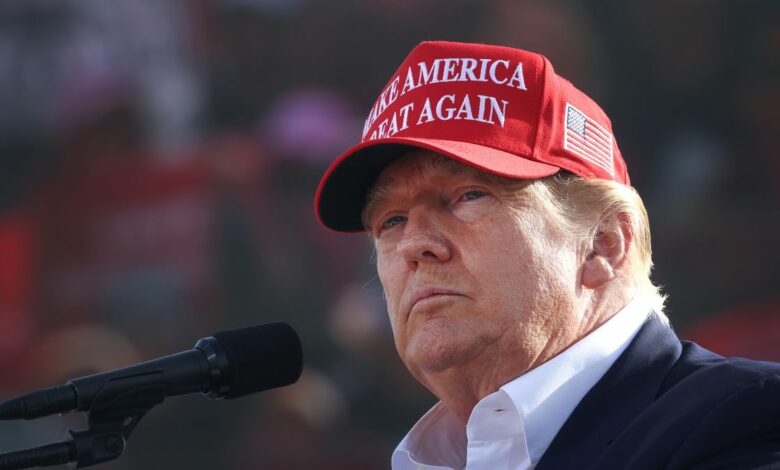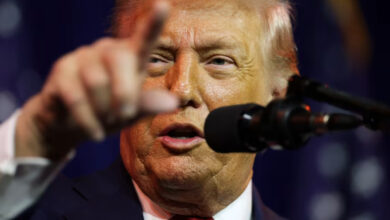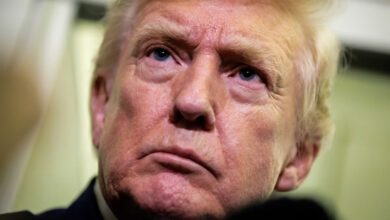
(CNN) – One of the most fateful questions in politics is about to start getting some answers.
It revolves around this: How long will ex-President Donald Trump continue to exert his mystical magic over the Republican Party, spell doom in the hearts of Americans who fear his return to power and retain his hold on America’s psyche?
A series of Trump interventions in Republican primaries ahead of the midterm elections, and several investigations into Trump’s attempt to steal the 2020 election will reach critical points during the next few weeks and months and could help shape the ex-President’s path.
A new dimension to the midterm campaign suddenly opened up on Monday night with the staggering news that Politico had obtained what it called a Supreme Court draft opinion suggesting the conservative majority built by Trump would overturn the landmark 1973 Roe v. Wade decision granting a constitutional right to an abortion. The drama, which could stoke turnout in November for both parties, heralds a possible massive victory for the conservative movement decades in the making and validates the decision of social conservatives to stick with Trump despite reservations about his moral conduct.
Nearly seven years after he burst onto the political scene, and 16 months since he left the White House in disgrace after a coup attempt, Trump remains a fulcrum around which much of the nation’s politics pivots. This is extraordinary for an ex-President — though Trump is breaking the mold in his post-White House life much as he did when he rocked the nation from the Oval Office. And unlike most presidents who are beaten in an election or term-limited, he apparently believes that the most glorious chapter of his political life is still before him.
“The 45th and 47th,” Trump declared to golf partners in a video that went viral in January after he was introduced on the tee as the “45th President of the United States”
Still, other than Trump’s demonstrations of control over House Republican leader Kevin McCarthy, who could become speaker if the GOP wins in November, and the way Republican candidates across the country have modeled themselves in his image, there have been few tangible tests of Trump’s enduring wider appeal since January 2021.
Electorally, that will change in the coming weeks, with Trump’s endorsements in Republican primary races on the line in Ohio, Pennsylvania, North Carolina, Georgia and elsewhere. While Trump is not on the ballot and these elections will not deliver exact science about his power, they will offer clues to Republican strategists wondering if there is an alternative lane to the ex-President’s in the 2024 Republican primary that could open up after the midterms.
Results from one key Senate GOP primary — in Ohio on Tuesday night — will offer some of the earliest signs of Trump’s influence, as his candidate — “Hillbilly Elegy” author J.D. Vance — seeks to catapult to victory on the ex-President’s hard-won endorsement.
Trump’s political weight is also driving his zeal for revenge in races where he is backing primary challengers to take out his GOP enemies. In Wyoming, for example, he’s backing a challenger to Rep. Liz Cheney, who is running for reelection despite being one of the few Republicans to tell the truth about his attempt to wreck American democracy. Trump also hopes to topple Alaska’s Sen. Lisa Murkowski, who voted to convict him after his second impeachment trial last year, and has backed Kelly Tshibaka to take her on.
Trump’s bond with his base
One of the most revealing answers that the November midterm results will yield is whether a Trump-focused campaign rooted primarily in the fallacy that the 2020 election was stolen is a viable path for a Republican presidential campaign.
Millions of voters who backed Trump in 2020 now appear to believe his false claims, which in themselves have inflicted a grievous wound on the credibility of American democracy. Yet Trump also clearly retains a strong connection with his most faithful voters. The forests of new Trump signs in the heartland, which stand distinct from the weathered versions from 2020, are proof of that. The ex-President remains an avatar for voters who soured on what they see as coastal elites and who embraced his wrecking ball politics because they believe the US system long ignored their values and economic plight. That gives him real power over Republican office-seekers — especially those in primaries where base turnout is often decisive.
Still, there have been hints of vulnerability for the Trump brand as well.
In a March poll by NBC News, 40% of respondents who were Republican or leaned Republican identified themselves more as supporters of Trump than of the GOP. Fifty-three percent said they were more supporters of the party. Just before the 2020 election, 54% said they were primarily Trump backers and 38% favored the party.
Theoretically, such data, if trends continue, could give other presidential candidates hope in a Republican primary that still looks set to be dominated by the ex-President.
One veteran Republican, Arkansas Gov. Asa Hutchinson, said on CNN’s “State of the Union” on Sunday that it was time for the party to choose someone else.
“I think Trump did a lot of good things for our country, but we need to go a different direction,” Hutchinson, an authentic conservative who said Sunday that he is considering a 2024 bid, told Dana Bash.
If Republican voters hanker for something more ideologically founded in the 2024 cycle, Florida Gov. Ron DeSantis is building a record on cultural issues that excite base Republicans, including restrictions on transgender rights, limitations on the teaching of race in school, curtailed voting rights and rollbacks of gun control measures.
It remains unclear whether DeSantis would challenge Trump, since his comparative youth at age 43 means he can afford to play the long game in presidential politics. But he’s building the kind of resume that would allow him to taunt rivals, especially from the Senate, in a GOP presidential debate by saying he’s already implemented their presidential wish lists in his own state.
Legal threats to Trump as the clock turns back to January 6
Trump’s future is about to again be wrapped up in the mayhem of the January 6 insurrection, which he incited, in a series of high-profile hearings next month held by the House select committee investigating the riot.
Sources have told CNN the panel intends to produce a compelling multimedia narrative that will imprint the reality of the attack on voters’ minds. The committee has not yet decided whether to recommend that the House make a criminal referral of the former President to the Justice Department — a move that would set up one of the most high-profile dilemmas in modern American politics for Attorney General Merrick Garland. But a revealing depiction of what happened in January 2021 and Trump’s role in directing it would be one way for the committee’s work to live on if, as expected, it is quickly shut down by Republicans if they win the House majority.
Still, given the entrenched feelings stirred for and against Trump, it is unclear whether any presentation, no matter how horrific, would meaningfully shift perceptions about the ex-President and his future political ambitions.
If anything, the frightening reality of the Capitol insurrection has become more pronounced with every month that passes. Just the last few weeks of revelations — many involving text messages to and from then-White House chief of staff Mark Meadows — have exposed the shocking fact of how far Trump and those around him were ready to go to ignore the will of the American people in a democratic election in order to try to keep him in power.
CNN reported, for instance, how officials in Georgia had tried to get Meadows to call off the then-President as he placed relentless pressure on Georgia’s secretary of state, Republican Brad Raffensperger, to “find” the votes to overturn Joe Biden’s victory in the crucial state.
That phone call by Trump is now at the center of what might turn out to be the most dangerous legal threat facing the ex-President. Atlanta-area prosecutors convened a special grand jury Monday to assess whether any of his actions in Georgia after the 2016 election were criminal.
“We’re going to look at anything connected with interference with the 2020 election,” Fulton County District Attorney Fani Willis said in an interview Monday with CNN’s Anderson Cooper, adding that that will include looking into the fake Electoral College certifications that Trump backers put forward in Georgia.
The Trump organization, meanwhile, has potential exposure in a civil investigation by New York Attorney General Letitia James over what she says is significant evidence that the firm was guilty of loan, tax and insurance fraud.
But charges seem unlikely in a separate, criminal probe of the Trump Organization’s business practices by the New York district attorney’s office, since a grand jury has expired.
The kingmaker could weaponize a House majority
The fact that GOP primary candidates are still competing over who is most loyal to him is a testament to Trump’s grip on his party — especially since he’s been deprived of access to Twitter after the platform banned his account in case he would use it to further incite violence after the insurrection. Trump’s own social media platform, Truth Social, has had severe growing pains and the former President has said he won’t go back to Twitter despite its pending takeover by Elon Musk. But the ex-President has been known to change his mind before, and the prospect of reconnecting with his tens of millions of followers may tempt him back.
The clearest barometer of Trump’s still-dominant power over the GOP is in the House.
Last month, McCarthy faced a choice: Tell the truth about his comment to fellow GOP leaders that he was considering asking Trump to resign after the insurrection — or deny it. He took the latter course and refused to back down despite his denial being swiftly exposed by an incriminating tape obtained by New York Times reporters Jonathan Martin and Alex Burns for their new book, “This Will Not Pass: Trump, Biden and the Battle for America’s Future,” which publishes on Tuesday.
The episode was an extraordinary window into how Trump’s influence over the Republican House conference will not just be critical for McCarthy’s hopes of becoming speaker. It would also turn a possible future GOP House majority into a powerful weapon for Trump to use to attempt to weaken Biden with punishing investigations and hearings ahead of their possible rematch in 2024.
With the ex-President’s hand secure on that particular lever of power, the coming weeks and months will begin to flesh out the puzzle on other key political fronts that will determine his viability if he runs for president again.




